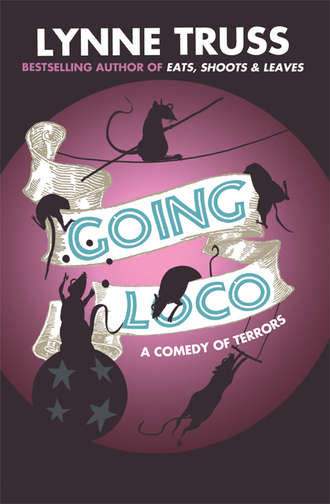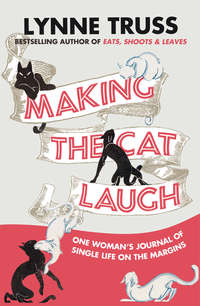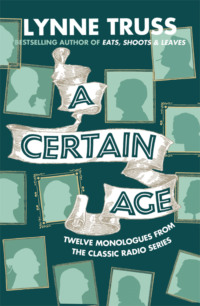
Полная версия
Going Loco
‘No, it’s true. I sometimes think you could unravel my DNA just by looking at me. And then, of course, you could knit me up again, as someone else with different sleeves and a V neck.’
Belinda envied the way Stefan’s work fitted so neatly into the time he spent at college. She imagined him now with enormous knitting needles, muttering, ‘Knit one, purl one, knit one, purl one,’ in a loud, clacky room full of brainy blokes in lab coats all doing the same, trying to finish a complicated bit (turning a heel, perhaps) before the bell rang at five thirty.
People were always telling Belinda that genetics was a sexy science, but Stefan said it was harmless drudgery – and she was happy to believe him. Clueless about the nitty-gritty, she just knew that his research involved things called dominant and recessive genes. ‘So some genes are pushy and others are pushovers, and the combination always causes trouble?’ she’d once summed it up. And he’d coughed and said gnomically, ‘Up to a point, Lord Copper.’
At that momentous Sunday lunch, she had not told him much about her own work. As she discovered later, Swedes don’t ask personal questions; they consider it ill-mannered. But she had told him about Patsy Sullivan, and made him laugh describing the horsy adventures. However, the time she regarded as daily stolen from her had nothing to do with her desire to write about red rosettes for handy-pony. It wasn’t time she wanted for ‘herself’, either. Magazines sometimes referred to women making time for ‘themselves’, but driven by her Keatsian gleaning imperative, Belinda had absolutely no idea what it meant. ‘Make time for yourself.’ Weird. Chintzy wallpaper probably had something to do with it. Long hot baths. Or chocolates in a heart-shaped box.
Thus, if well-intentioned people chose to flatter Belinda in a feminine way, it just confused her. ‘Buy yourself a lipstick,’ Viv’s mother had said during her university finals, giving her a five-pound note. But the commission had made her miserable. She’d hated hanging around cosmetics counters with this albatross of a fiver when she could have been revising the Gothic novel in the library. Belinda’s revision timetable had been incredibly impressive, and very, very tight. Only when Viv absolved her with ‘Buy some pens, for God’s sake,’ did she race off happily and spend it.
Yes, for someone who lived so much in her head, it was an alien world, that feminine malarkey. Luckily the other-worldly Stefan didn’t mind too much, but Belinda’s well-coiffed mother despaired of her, and left copies of books with titles like Femininity for Dummies lying around in her daughter’s house. Yet even as a teenager Belinda had flipped through all women’s magazines in lofty, anthropological astonishment, amazed at the ways contrived by modern women to occupy their time non-productively. Facials, for heaven’s sake. Leg-waxing. Fashionable hats. Stencils.
From this you might deduce that Belinda’s secret personal work was of global importance. But she was just writing a book called The Dualists, a grand overview of literary doubles through the ages. Being Patsy half the time had given her the idea. ‘Like Dr Jekyll and Mr Hyde,’ she explained, when people looked blank. ‘Or like me and Patsy Sullivan.’ But if she implied that she took the subject lightly, she certainly didn’t.
In fact, like most areas of study, the closer you got to the literary double, the more importantly it loomed; the more it demonstrated links with life, the universe, everything, even genetics and photocopying. Abba impersonators, Siamese twins, Face/Off – the world was full of replicas. And why was the genre so popular? Because everyone believes they’ve got an alternative, parallel life – in Belinda’s case, perhaps, the ideal existence of that unregenerate toff Virginia Woolf, with her pure and rounded pearls. This parallel life was just waiting for you to join it, to stop fannying about. Every time you made a choice in life, another parallel existence was created to demonstrate how your own life could have been. Surely everybody felt that? Surely everybody looked in the mirror and thought, That’s not the real me. It used to be, but it’s not now. Surely everyone measured themselves against their friends? Especially these days, when everyone was so busy?
Either way, for the past three years, between all the demands of Patsy and socks (and Stefan), Belinda had left unturned not a single existential book in which a malevolent lookalike turned up to say, ‘I’m the real you. And hey, you’re not going to like what I’ve been doing!’ Her office, formerly the dining room, was heaped with books and notes. She had become an expert on the dark world of Gogol and Dostoevsky, Nabokov, Stevenson and Hogg. Name any writer who shrieked on passing a reflective shop window, and Belinda was guaranteed to have a convincing theory about the personal crisis that conjured up his story, and summoned his double to life.
Oh yes, the nearer you stood to the literary double, the more (spookily) it told you universal truths of existence. Unfortunately for Belinda, she could never quite appreciate that the further you stood back from the literary double (as all her friends effortlessly did), the more it resembled leg-waxing by other means.
The phone rang at ten o’clock and Stefan answered it.
‘It was a man from British Telecom, seemed a bit rum,’ he reported to Belinda, who was curled up with a book in her study, Neville snoozing contentedly save for the occasional twitch of his little pink tail. ‘His name was Graham.’
Belinda bit her lip. ‘Oh yes?’
‘He was ringing from home, to check you were recovered. I told him, “This is ten o’clock at night, were you born in a barn?”’
Belinda looked amazed. Neville stirred.
‘You are all right, aren’t you, Miss Patch? He said he only mentioned his money-off Friends and Family scheme and you wept, like cats and dogs.’
She nodded. She felt cornered. When women had breakdowns, their husbands left them. It was a well-known fact. When Stefan’s former wife Ingrid had a breakdown, he left her good and proper, in an institution in Malmö.
‘You try to do too much,’ he said.
‘I know.’
‘It’s not my fault, is it?’
Belinda gasped. His fault?
He searched her face, which crumpled under the strain of his kindness.
‘Of course it’s not,’ she snuffled.
‘Come to bed,’ he said, reaching to touch her.
‘All right,’ she said.
‘You must not forget, Belinda. No man is an island.’
‘No.’
She put down her book, and got up.
He smiled. ‘The thing about you, Belinda, is you need two lives.’
‘Well, three or four would be nice,’ she agreed, switching off the light. ‘Why don’t you make some clones for me? You know perfectly well you could knock up a couple at work.’
Two
It was eleven thirty on Tuesday night in Putney, the candles were guttering, and Jago was telling a joke over coffee. It was one of the smart showbiz ones he’d picked up on a trip home to New York several years ago.
‘So the neighbour in Santa Monica says, “I tell ya, it was terrible. Your agent was here and he raped your wife and slaughtered your children and then he just upped and burned your damn house down.” And the writer says, “Hold on a minute!…”’ Here Jago paused for a well-practised effect. His guests looked up.
‘“Did you say my agent came to my house?”’ Belinda laughed with all the others, although she’d heard Jago tell this joke before. Oh, understanding jokes about agents, didn’t it make you feel grown-up and important? She remembered the first time she’d managed to mention her agent as a mere matter of fact, without prefacing it with ‘Oh listen to me!’ It had been one of those Rubicon moments. No going back now, Mother. No going back now.
To be honest, Belinda’s grand-sounding agent – A. P. Jorkin of Jorkin Spenlow – was a dusty man she’d met only once. But he was adequate to her meagre purposes, being well connected as well as reassuringly bookish, though alas, a sexist. ‘Let’s keep this relationship professional, shall we?’ she’d said to him brightly in the taxi, when he put his hand on her leg and squeezed it. ‘All right,’ he agreed, with a chalky wheeze, pressing harder. ‘How much do you charge?’
Ah yes, she’d certainly made a disastrous choice with Jorkin, but changing your agent sounded like one of those endlessly difficult, escalatory things, like treating a house for dry rot. For a woman who can’t be arsed to pick up a sock, it was a project she would, self-evidently, never undertake. ‘Perhaps he’ll die soon,’ she thought, hopefully. Random facial hair sprouted from Jorkin’s cheek and nose, she remembered dimly. She really hated that.
Jago’s agent, of course, was quite another matter. Not that Jago ever wrote books, but having a big-time agent was an essential fashion accoutrement once you reached a certain level in Fleet Street: the modern-day equivalent of a food-taster or a leopard on a chain. Dermot, who often appeared on television, was famously associated with those other busy scribblers, the Prime Minister and the Archbishop of Canterbury. Complete with his too-tight-fitting ski tan, he was tonight’s guest of honour, amiably telling Stefan about rugby union in South Africa, fiddling with a silver bracelet, and recounting jaw-dropping stories about being backstage at Clive Anderson. No random facial hair on this one. No hair at all, actually. When she’d told him in confidence about her book on literary doubles, he’d laughed out loud at the sheer, profitless folly of it. ‘Here,’ he’d said, taking off his belt with a flourish. ‘Hang yourself with that, it’s quicker.’
Tonight he was feeling more generous, so he gave her a tip. ‘Belinda, why don’t you write a bittersweet novel about being single in the city with a cat?’
‘Perhaps because I hate cats and I’m not single, and I don’t write grown-up fiction.’
‘OK, but single people sell.’
‘Which is why I’m writing about double people, no doubt.’
‘Well,’ he sighed, leaning towards her and picking imaginary fluff from her shoulder, ‘you said it.’
Belinda wondered now whether she should have taken his advice. Was her literary work above fashion? Or just so far beyond it that it had dropped off the edge? She poured herself some more wine and took a small handful of chocolates. Relaxation on this scale was a rare and marvellous thing. Neville had given the other rats the night off, evidently, and was spending the evening quietly oiling his whip. Stefan was now teasing Dermot about the real-life chances of an attack of killer tomatoes (for some reason, Dermot was rather exercised on this point); Jago was arguing good-naturedly with Dermot’s assistant about modern operatic stage design. Maggie (bless her) seemed to be adequately hitting it off with the spare man Viv always thoughtfully provided – this time a long-haired, big-boned sports reporter plucked without sufficient research from Jago’s office. And, with all the dinner finished, it now befell Belinda to adopt her perennial role at dinner parties – i.e. pointlessly sucking up to Viv.
‘That was such a good meal,’ she began. ‘I don’t know how you do it. I feel like I’ve eaten the British Library. I can’t even buy ready-cook stuff from Marks and Spencer’s any more, did I tell you? Every time I go in, I see all the prepared veg and I get upset and have to come out again. Even though I haven’t got time to prepare veg myself, I’m so depressed by bags of sprouts with the outer leaves peeled off that I have to crouch on the floor while my head swims. Has that ever happened to you?’
Viv shrugged. She refused to be drawn into Belinda’s domestic inadequacies. After all, they’d been having the same conversation for eighteen years. Also, praise always made her hostile – a fact Belinda could never quite accept, and therefore never quite allowed for.
‘I like your top,’ Belinda said.
‘Harvey Nicks. I went back to get another one, actually, but they only had brown. Nobody looks good in brown. I don’t know why they make it.’
Belinda wondered vaguely whether her own top-to-toe chocolate was exempt from this generalization. She didn’t like to ask.
‘What do you think about Leon for Maggie?’ Viv demanded.
‘The petrolhead?’
‘Yes.’
‘Well, I can’t say he’s perfect. So far his only conversation is pit-stop records. He just told Maggie that Rembrandt wasn’t a household name.’
‘Yes, but Maggie is so lonely and desperate, she might not mind a diversity of interests.’
They paused to hear what was happening between Maggie and Leon.
‘Villeneuve’s a person?’ Maggie was saying. ‘Good heavens! So what’s the name of that bridge in Paris?’
Belinda raised an eyebrow, while Viv pretended not to hear. What a terrible life Maggie had. She looked pityingly at Maggie and saw how her own life might have turned out, if only she hadn’t responded so well to the nickname Patch. In her spare time, Maggie did therapy. When she got work, it was underpaid. It was common knowledge that she slept with totally unsuitable people. And when she went out to her friends’ house for a pleasant evening, looking more glamorous than the rest of them put together, they thoughtlessly paired her with a talking ape.
Sitting here, Belinda was caught in a common dilemma of women who compare themselves with others. With whom should she compare herself tonight? Beside Maggie, she looked rather accomplished. Whereas beside Viv, she looked like a road accident. Viv did dinner parties for eight without breaking stride. She had three sons with long limbs and clean hair who said, ‘Hello, Auntie Belinda, do you want to see my prize for geography?’ and ‘Guess what, I’ve got another part in a radio play.’ Viv dressed beautifully in navy. She attended a gym and went swimming. She canvassed for the Labour Party. And, just to give her life a bit of interest, she was the youngest ever female consultant anaesthetist of a major London private hospital.
Belinda took another reckless swig of wine. She used to say she had only two modes when it came to drinking: abstinence and abandonment. Looking at her fifth glass, she realized this system had recently simplified.
‘Jago got made executive features editor at the Effort.’
Belinda put down her glass with a clunk. ‘I didn’t know that.’
‘Last week. Bunter Paxton was kicked upstairs.’
‘Fuck.’
‘Dermot says it’s all part of his plan. I’m warming to Dermot. Are you?’
Belinda struggled to find the right thing to say. She was impressed, upset, mortified. Comparisons might be odious, but Viv and Jago were her own age. Identically her own age. She and Viv had started adult life with almost identical opportunities, from exactly the same spot, in fact: queuing for DramSoc at University College London, where they were subsequently cast as Helena and Hermia in A Midsummer Night’s Dream alongside Jago as Bottom. Viv was in medicine; she and Jago were in English. She had rather fancied Jago in those days. Hard to imagine now. Stefan was so good, so dear, the way he just fitted in. What a shame his first wife, the loony one in Malmö, had got custody of all their Swedish friends.
Viv nudged her to look at Maggie and Leon again. They had their heads together. ‘Anal?’ Leon was querying, his body language expressive of severe discomfort. He ran his hand through his long, greasy hair. ‘Are you sure?’
Belinda wrestled briefly with self-pity, and lost. Just look at what Viv had made of her life. I could have had that. She was beginning to remember why she didn’t enjoy going out.
‘And yet you go to all this trouble,’ she marvelled, waving a hand.
Viv sighed. Not this again. Not that Superwoman crap.
‘I’m not getting into this again, Belinda, I warn you. As I’ve told you a million times, my cleaning lady does everything in this house, and I don’t lift a finger. In fact, I’m sorry to say this,’ Viv’s voice rose, ‘but I wish you’d just shut up about it.’
Even in her drunken state, Belinda was startled by Viv’s high-handed, imperious tone. Just because you abjectly deferred to someone year after year, paying them superlative compliments, that surely didn’t give them the right to assume some sort of superiority, did it?
‘All right, keep your hair on,’ slurred Belinda, ‘I only said –’
‘Listen, I’m just going to say this to you, Belinda. Just this. Sack Jorkin. Lose Patsy. Boot Mrs Holdsworth.’
‘Is that all?’
‘That about covers it, yes.’
‘Should I move to Botswana as well?’
‘I’m just telling you how it looks from where I’m standing. And where lots of other people are standing too.’
‘Mrs H washes her hair with Daz, Viv. She lives on water boiled up from old sprout peelings. She hasn’t had a new scarf for ten years.’
Other chatter stopped abruptly as Belinda’s voice rose. Only Leon could be heard, saying, ‘Penile? In what way?’
Stefan intervened. ‘I agree with Viv you should award Mrs Holdsworth the Order of the Boot,’ he offered, with a smile. ‘Viv is right, as always. Mrs Holdsworth takes the piss and cooks her own goose long enough. Tell her to up stumps. A good wine needs no bush.’
Belinda was confused, and a bit resentful. She didn’t understand how sacking the cleaning lady would in any way improve her ability to give dinner parties. And she disliked it, naturally enough, when pleasant evenings with chums and husband turned Stalinist all of a sudden. She couldn’t remember the last time she saw it on a menu. Dessert followed by show trials; then coffee and mints.
‘You need people with a bit of initiative around you,’ said Viv. ‘There’s nothing supernatural about what I do. I just hive off bits of my life I don’t want. You could do that. I give mine to Linda. The cleaning lady. She does everything. She’s doing the washing-up right now. She did all the shopping and most of the cooking.’
Belinda nodded. ‘Linda,’ she repeated, dumbly. So deeply did Belinda believe in Viv’s domestic powers, she had always suspected Linda was an invention.
‘I’ve got no sympathy for you, Belinda. None whatever.’
‘Thanks.’
‘You know what I mean.’
Belinda sniffed loudly, and started to fish under her chair for her handbag. ‘Stefan, shall we go home soon?’
‘Oh for God’s sake, don’t take offence,’ snapped Viv. ‘I’m only thinking of you, as usual.’
Belinda noticed that the others had stopped talking, in order to listen better. She was not unaware that tiffs with Viv were becoming a regular feature of fun nights out. She tried a last-ditch compliment, to deflect attention. It didn’t work. ‘You’ve redecorated this room,’ said Belinda. ‘It’s lovely. All this white is very attractive.’
‘Well, we got sick to death of sea green. No one has that any more.’
Belinda experienced a familiar sensation, remembering her own sea-green bedroom, bathroom, kitchen, hall and array of fitted carpets. ‘All right,’ she said, seeing that flattery was getting her nowhere. ‘Assuming I can get someone brilliant like your Linda, how do I choose which bits of my life to give her? I wouldn’t know where to stop, I mean start.’ Belinda thought about it, and felt a bit sick. ‘No, I was right the first time. I wouldn’t know where to stop.’
Viv arranged some wine bottles in a line. She was resisting the urge to hit Belinda. ‘Belinda, just imagine you had the choice. Would you rather sit in your study reading about – what is it you want to read about all the time?’
‘Doubles. Like Dr Jekyll and Mr—’
‘OK. Would you rather sit in your study reading that ridiculous old nonsense, or – I don’t know – keep the loo seat free from nasty curly pubes?’
Belinda masticated a truffle. It tasted wonderful, like violets. It took her mind off the hurtful implication that her curly pubes were nasty. ‘All right,’ she said warily, ‘I’ll replace Mrs Holdsworth. But I’m keeping Jorkin and Patsy.’
‘It’s your funeral,’ said Viv, and getting up, she started to clear dessert plates.
Stefan leaned across. ‘How about we ask this Linda if she can work for us too? She doesn’t work for you every God’s hour, I think?’
It was the most innocent of questions. But had they heard a suicidal gunshot from the downstairs cloakroom the effect could not have been more Ibsenesque. Viv stood up and knocked over her chair; Jago shot her a meaningful glance; Viv’s eyes widened in anger as she turned to face Belinda.
‘If you do that,’ she said, ‘I warn you, I’ll never speak to you again.’
Belinda laughed. They all did. Maggie even clapped. But Viv was serious. ‘Take my cleaning lady, you ungrateful bitch—’
‘Viv, we’re only talking about a cleaning lady! This is ridiculous.’
Jago chipped in. ‘I know it sounds crazy. Linda’s more than a cleaning lady, that’s all. She has a way of making herself indispensable. And let’s just say—’
‘That’s enough, Jago.’
Belinda fell back in her chair, exhausted. ‘I don’t get it,’ she confessed. ‘I’m sorry, but I don’t get it.’
‘Coffee?’ said Viv.
‘I’ll help,’ offered Dermot.
Belinda and Stefan pulled faces at one another.
At the other side of the table, Leon presented Maggie with a perfect, tiny origami racing car, folded out of a napkin. ‘All right,’ he said. ‘Tell me what’s anal about that.’
Belinda woke up suddenly. How long she’d been nodding at the table she didn’t know. Noticing Viv was missing from her side, however, she stood up to find her but lurched unexpectedly and almost sat down again. She must be drunk. Jago was now telling Leon a familiar joke about a Jewish widow addressing her husband’s ashes in her hand. ‘“Remember the blow-job you always wanted, Solly?”’
Trying for a second time, she got up successfully and propelled herself towards the door – at which point, she heard Viv on a darkened landing, whispering angrily to Dermot.
‘I wouldn’t mind but she owes everything to me,’ Viv was saying.
‘Belinda’s a real nobody,’ Dermot agreed. ‘A nothing of a nobody.’
Belinda leaned against a wall and listened.
‘I introduced her to Stefan. It was all me. But she’s never content.’
‘Some people suck the blood out of you. They’re vampires. I see it every day, people taking the credit when everything they do is my idea. You have to tell them how great they are all the time. Belinda just takes and takes.’
‘You’re right. People only ever want to talk about themselves. We’re just mirrors they see themselves in. Mirrors in which they flatter themselves.’
Dermot’s voice became tender. ‘You shouldn’t be bothering with vampires, Viv. You should think only of your lovely, lovely self. I know I shouldn’t say it, but Viv, I mean this, you’re such a good person.’
Belinda held her breath and grimaced. Dermot clearly didn’t understand that flattering Viv made her vicious – sometimes to the point of violence. But something else happened. Because Viv evidently caught a sight of herself in Dermot’s flattering mirror.
‘Am I?’ said Viv.
‘You’re so good, so fine. In fact, I admire you very much.’
‘You do?’
‘I’ve got no reason to say this, incidentally.’
‘I know.’
There was a pause while the loathsome Dermot thought of some more sugary things to say. Belinda was astonished.
‘You’re fantastic,’ he continued.
‘Thank you.’
‘And, you know, I love just talking about you freely like this, without you feeling you have to say anything reciprocal about me.’
‘Wow.’
Belinda backed away to the kitchen, fearful of overhearing the inevitable culminating squelch of a kiss in the dark. Her emotions were mixed, and her demeanour unsteady, but her intention was perfectly clear. As she made her way to the kitchen, she had one single thought. She would hire Linda. Ungrateful vampire bitch that she was, she was determined to take, take, take. Petulance was an emotion that held no fears for Belinda. If Viv thought so badly of her already, then stealing her cleaning lady was obviously the very least she owed her reputation.








